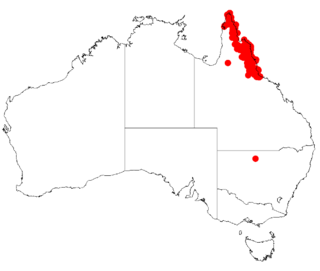
Acacia conniana is a shrub belonging to the genus Acacia and the subgenus Juliflorae that is endemic to the southern coast of western Australia.

Acacia incanicarpa is a shrub belonging to the genus Acacia and the subgenus Juliflorae that is endemic to western Australia.
Acacia incongesta, also known as Peak Charles wattle, is a shrub belonging to the genus Acacia and the subgenus Juliflorae that is endemic to a small area in south western Australia

Acacia jibberdingensis, also known as Jibberding wattle or willow-leafed wattle, is a shrub or tree belonging to the genus Acacia and the subgenus Juliflorae that is endemic to Western Australia.

Acacia oncinocarpa is a shrub or tree belonging to the genus Acacia and the subgenus Juliflorae that is endemic to northern Australia.

Acacia oncinophylla, commonly known as hook-leaved acacia, is a shrub belonging to the genus Acacia and the subgenus Juliflorae.

Acacia sessilispica is a shrub belonging to the genus Acacia and the subgenus Juliflorae native to Western Australia.
Acacia stanleyi, commonly known as Stanley's rock wattle, is a shrub belonging to the genus Acacia and the subgenus Juliflorae that is endemic to south western Australia.

Acacia capillaris is a shrub belonging to the genus Acacia and the subgenus Lycopodiifoliae that is endemic to small area in north western Australia.

Acacia clydonophora is a shrub belonging to the genus Acacia and the subgenus Phyllodineae that is endemic to Western Australia.

Acacia cupularis, commonly known as the Coastal Umbrella Bush, is a shrub belonging to the genus Acacia and the subgenus Phyllodineae that is endemic to southern parts of Australia.

Acacia dentifera, commonly known as tooth-bearing acacia, is a shrub belonging to the genus Acacia and the subgenus Phyllodineae that is endemic to south western Australia.

Acacia gonophylla, also known as rasp-stemmed wattle, is a shrub belonging to the genus Acacia and the subgenus Phyllodineae that is endemic to south western parts of Australia.

Acacia veronica, commonly known as Veronica's wattle, is a shrub or tree of the genus Acacia and the subgenus Plurinerves that is endemic to a small area of south western Australia.

Acacia subtilinervis, also known as the net-veined wattle, is a rare wattle in the Juliflorae subgenus found in eastern Australia.

Acacia nematophylla, commonly known as coast wallowa, is a shrub belonging to the genus Acacia and the subgenus Phyllodineae where it is endemic to southern Australia.

Acacia kydrensis, commonly known as Kydra wattle, is a shrub of the genus Acacia and the subgenus Phyllodineae that is endemic to south eastern Australia.

Acacia calyculata is a shrub belonging to the genus Acacia and the subgenus Juliflorae that is native to north eastern Australia.

Acacia williamsiana is a tree or shrub belonging to the genus Acacia and the subgenus Juliflorae that is native to eastern Australia.

Acacia pycnostachya, also known as Bolivia wattle, is a shrub or tree belonging to the genus Acacia and the subgenus Juliflorae that is native to eastern Australia.


















